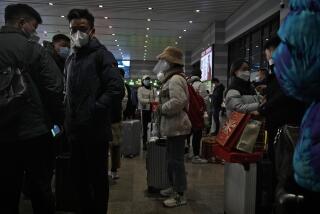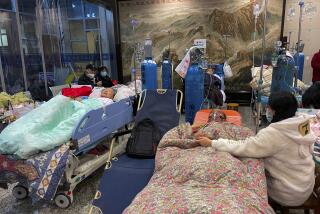China to quickly build hospital to treat coronavirus; Shanghai Disneyland closes

- Share via
BEIJING — China announced Friday that it is swiftly building a 1,000-bed hospital dedicated to patients infected with a new virus that has killed 41 people, sickened thousands and prompted unprecedented lockdowns of cities during the country’s most important holiday.
On the eve of the Lunar New Year, transportation was shut down in at least 13 cities that are home to more than 36 million people. The cities are Wuhan, where the illness has been concentrated, and 12 of its neighbors in central China’s Hubei province.
Meanwhile, France announced two people had fallen ill with the virus — the first cases seen in Europe. And the U.S. reported its second case, involving a Chicago woman in her 60s who was hospitalized after returning from China. U.S. stocks fell in midday trading, especially airlines and other companies in the travel and tourism industry.
“To address the insufficiency of existing medical resources,” Wuhan is constructing a hospital modeled after the Xiaotangshan SARS hospital in Beijing, Wuhan authorities said in a Friday notice. The facility will be a prefabricated structure on a 270,000-square-foot lot, slated for completion Feb. 3.
The SARS hospital was built from scratch in 2003 in just six days to treat an outbreak of a similar respiratory virus that had spread from China to more than a dozen countries and killed about 800 people. The hospital featured individual isolation units that looked like rows of tiny cabins.
Normally bustling streets, malls and other public spaces were eerily quiet in Wuhan on the second day of its lockdown. Masks were mandatory in public, and images from the city showed empty store shelves as people stocked up for what could be an extended isolation. Train stations, the airport and subways were closed; police checked incoming vehicles but did not entirely close off roads.
Hospitals in Wuhan were grappling with a flood of patients and a lack of supplies. Videos circulating online showed throngs of frantic people in masks lined up for checks. Some users on the Weibo social media site said their family members had sought diagnoses but were turned away at hospitals that were at capacity.
At least eight hospitals in Wuhan issued public calls for donations of masks, goggles, gowns and other protective medical gear, according to notices online. Administrators at Wuhan University People’s Hospital set up a group chat on the popular WeChat messaging app to coordinate donations.
The “Fever Control Command Center” of the city of Huanggang also put out a call for donations publicized by the state-run People’s Daily, asking for medical supplies, medicine and disinfection equipment. The notice added that at the moment they wouldn’t accept supplies from foreign countries.
Authorities were taking precautions around the country. In the capital, Beijing, major public events were canceled, including traditional temple fairs that are a staple of Lunar New Year celebrations. Beijing’s Forbidden City, Shanghai Disneyland and a slew of other tourist attractions have been closed indefinitely.
The number of confirmed cases of the new coronavirus has risen to over 1,200, China’s National Health Commission has reported. Forty-one people have died, including the first two deaths outside Hubei and the youngest recorded victim.
The health commission in Hebei, a northern province bordering Beijing, said an 80-year-old man died there after returning from a two-month stay in Wuhan to see relatives. Heilongjiang province in the northeast confirmed a death there but did not give details.
While the majority of deaths have been older patients, a 36-year-old man in Hubei was admitted to the hospital earlier this month after suffering from fever for three days. He died following a sudden cardiac arrest on Thursday.
Initial symptoms of the virus can mirror those of the cold and flu, including cough, fever, chest tightening and shortness of breath, but can worsen to pneumonia. The coronavirus family includes the common cold as well as viruses that cause more serious illnesses, such as SARS and Middle Eastern respiratory syndrome, or MERS, which is thought to have originated from camels. The Wuhan outbreak is suspected to have begun from wild animals sold at a food market in the city. The market is closed for investigation.
The vast majority of cases have been in and around Wuhan, but people who visited or had personal connections to infected people were among the scattered cases counted beyond the mainland. South Korea and Japan both confirmed their second cases Friday; Singapore confirmed its third and Thailand its fifth. Cases have also been detected in Hong Kong, Macau, Taiwan, the United States and Vietnam.
Many countries are screening travelers from China and isolating anyone with symptoms.
The World Health Organization decided against declaring the outbreak a global emergency for now. The declaration can increase resources to fight a threat, but its potential to cause economic damage makes the decision politically fraught.
Chinese officials have not said how long the shutdowns of the cities will last. While sweeping measures are typical of China’s Communist Party-led government, large-scale quarantines are rare around the world, even in deadly epidemics, because of concerns about infringing on people’s liberties.
Recalling the government’s initial cover-up of SARS, many Chinese are suspicious of the case numbers reported by officials. Authorities in turn have been keen to pledge transparency. China’s Cabinet, the State Council, announced Friday that it will be collecting information on government departments that have failed in their response to the new outbreak, including “delays, concealment and under-reporting of the epidemic.”
The state broadcaster CCTV’s annual Spring Festival Gala program, which attracted more than 1 billion viewers last year, paid tribute to the medical workers fighting the viral outbreak.
“Please believe in China,” the hosts said. “With the most transparent public information ... on the battlefront of the epidemic, we will definitely win.”
Tarik Jasarevic, a spokesman for the WHO in Geneva, said Friday that the U.N. agency has no case numbers beyond those already released publicly by China.
But he said the numbers “weren’t really the point.”
“It’s still too early to draw conclusions about how severe the virus is because at the beginning of any outbreak, you would focus more on the severe cases,” he said. “And then maybe we are missing some mild cases because people will just be a little bit sick and will not have it tested. And they will recover.”
“We may see more mild cases as the surveillance intensifies,” Jasarevic told reporters. “So the issue is not so much really numbers that we know will go up.”
More to Read
Sign up for Essential California
The most important California stories and recommendations in your inbox every morning.
You may occasionally receive promotional content from the Los Angeles Times.













